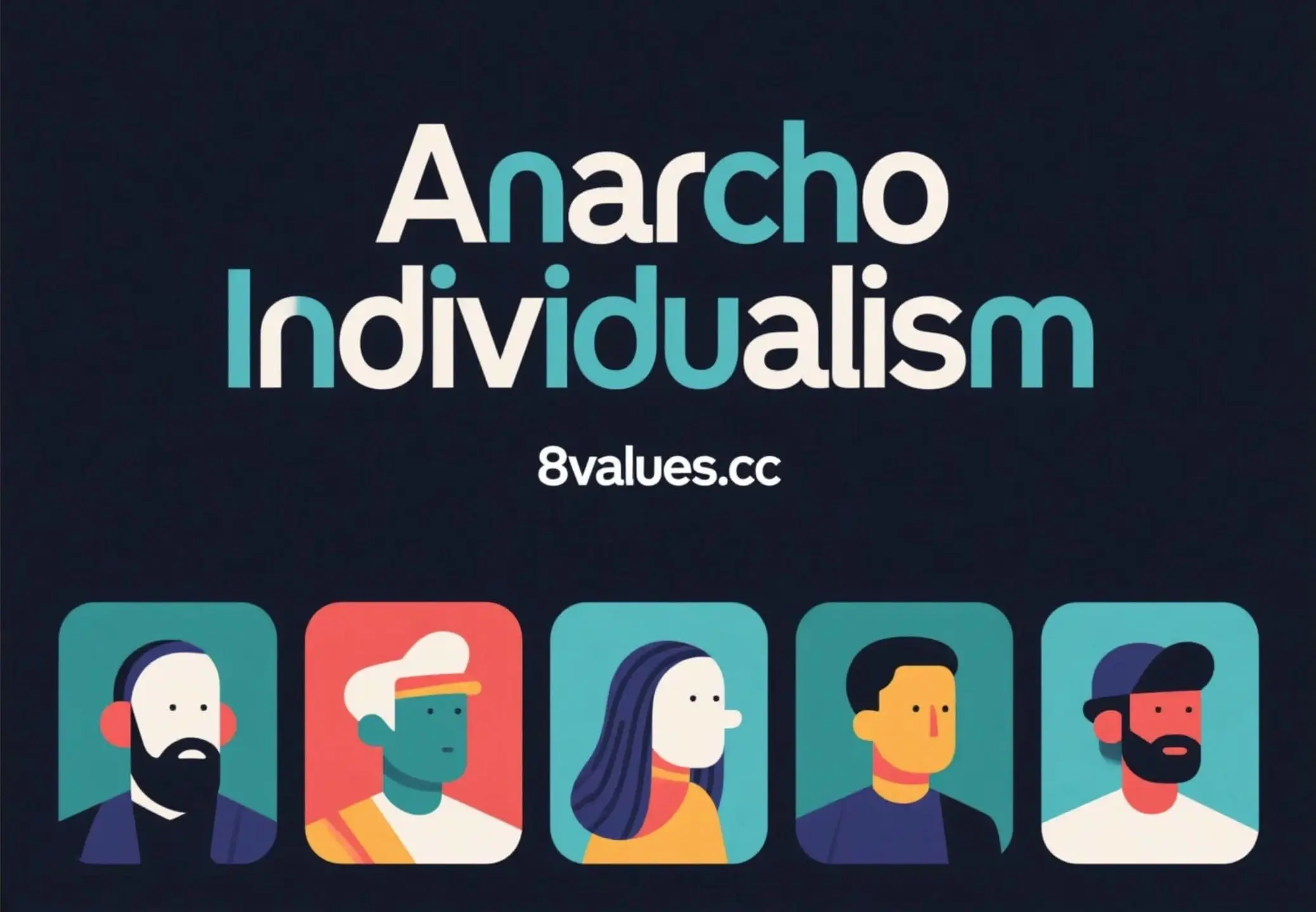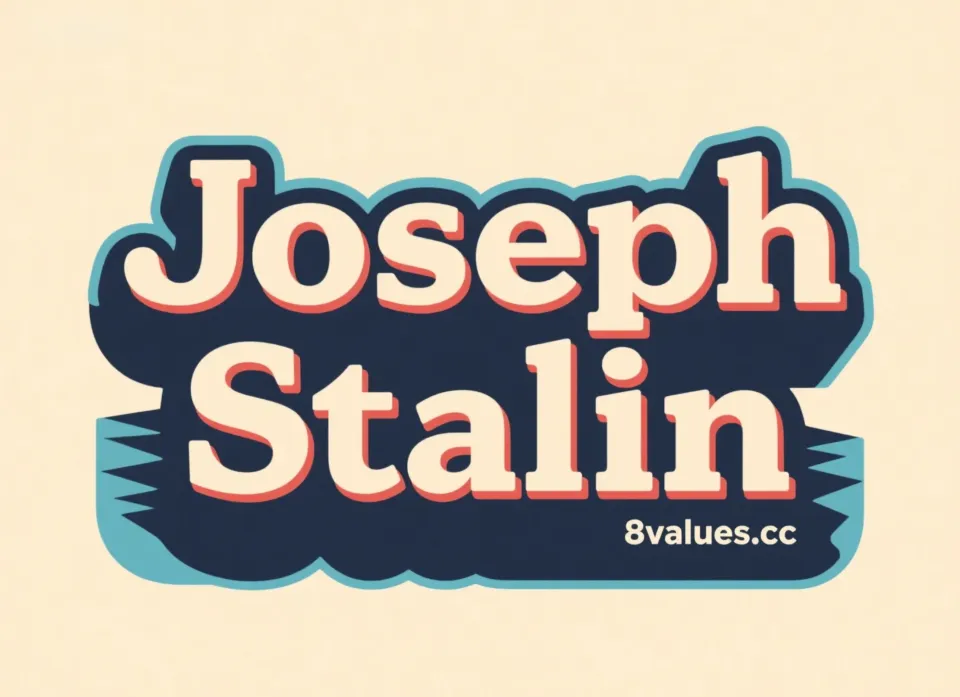अनारचो-इंडिविजुअलिज्म | राजनीतिक परीक्षणों में वैचारिक विचारधारा की 8values व्याख्या
एनाज व्यक्तिवाद एक राजनीतिक विचारधारा है जो व्यक्तिगत स्वतंत्रता पर जोर देती है और अधिकार और सामूहिकता का विरोध करती है। इस व्याख्या में, हम 8 वैल्यू टेस्ट (पॉलिटिकल स्पेक्ट्रम टेस्ट) के आयामों को अपने ऐतिहासिक उत्पत्ति, मुख्य विशेषताओं, आर्थिक विचारों और आधुनिक प्रभावों का गहराई से विश्लेषण करने के लिए जोड़ेंगे, जिससे आपको राजनीतिक स्पेक्ट्रम में इस विचार की अनूठी स्थिति को बेहतर ढंग से समझने में मदद मिलेगी।
अनारचो-व्यक्तिगतवाद एक अराजकतावादी स्कूल है जो इस बात पर जोर देता है कि व्यक्ति और उनकी इच्छाएं बाहरी बाधाओं जैसे कि समूहों, समाज, परंपराओं और विचारधारा को पार करती हैं। यह व्यक्तियों की पूर्ण स्वायत्तता और स्वतंत्रता की वकालत करता है, सामूहिकता और राज्य प्राधिकरण का विरोध करता है, और व्यक्तिगत श्रम के फलों के निजी स्वामित्व का समर्थन करता है। 8values राजनीतिक परीक्षण में, यह वैचारिक परिणाम स्वतंत्रता, स्वायत्तता और व्यक्तिगत अधिकारों के लिए महान महत्व को संलग्न करने के लिए उपयोगकर्ता की प्रवृत्ति को दर्शाता है।
एगर व्यक्तिवाद की मुख्य परिभाषा और विशेषताएं: व्यक्तिगत वर्चस्व की स्वतंत्रता का दर्शन
Anager व्यक्तिवाद की मूल विशेषताओं में शामिल हैं:
- व्यक्तिगत वर्चस्व : स्वतंत्रता, स्वायत्तता और संप्रभुता पर जोर देते हुए, सामाजिक जीवन के दिल में व्यक्तियों को डालें। व्यक्तिगत नैतिकता, सामाजिक मानदंडों, धर्म या दूसरों की इच्छा पर प्रबल होगा।
- सामूहिकता का विरोध : अत्यधिक सामूहिक शक्ति का दृढ़ता से विरोध करते हैं और व्यक्तिगत स्वतंत्रता की निरपेक्षता की वकालत करते हैं।
- निजी संपत्ति अधिकार : व्यक्तिगत श्रम उत्पादों के निजी स्वामित्व को बनाए रखें और गैर-अनिवार्य मुक्त वितरण पर जोर दें।
- राज्य और अधिकार का विरोध करें : राज्य को राजनीतिक, आर्थिक और सांस्कृतिक क्षेत्रों में किसी भी प्रकार के अधिकार का विरोध करते हुए भ्रष्टाचार और पदानुक्रम का प्रतीक माना जाता है।
- स्वायत्तता और आपसी सहायता : अराजकता अराजकता नहीं है, बल्कि आपसी सहायता, स्वायत्तता और विरोधी-विरोधीता की सामाजिक संरचना स्थापित करने के लिए मुक्त व्यक्तियों का एक स्वैच्छिक संयोजन है।
- क्रांति के बजाय विकास : बड़े पैमाने पर हिंसक क्रांतियों के बजाय वैकल्पिक अभ्यास, शिक्षा और प्रयोगों के माध्यम से स्वतंत्रता की स्थिति को धीरे-धीरे प्राप्त करना।
- आत्म-अन्वेषण और दावा : व्यक्तिगत अनुभव और रुचियों द्वारा संचालित पारस्परिक संबंधों पर जोर दें, और अस्थायी या असम्बद्ध सामाजिक तरीकों की मुक्त पसंद।
8 मूल्यों के परीक्षण के परिणामों के माध्यम से, उच्च व्यक्तिवाद स्कोर उपयोगकर्ता आमतौर पर स्वायत्तता, स्वतंत्रता दिखाते हैं, सामाजिक संबंधों में व्यक्तिगत अधिकारों के लिए महत्व संलग्न करते हुए, मुक्त बाजार और गैर-हस्तक्षेप नीतियों की ओर जाते हैं।
एगर व्यक्तिवाद और मुख्य विचारकों की ऐतिहासिक उत्पत्ति
एंग्स व्यक्तिवाद यूरोप में उत्पन्न हुआ और संयुक्त राज्य अमेरिका में विकसित हुआ। मुख्य विचारकों और योगदान में शामिल हैं:
यूरोपीय विचारक
- विलियम गॉडविन : "अराजक दर्शन के संस्थापक" के रूप में माना जाता है और चरम व्यक्तिवाद की वकालत करता है। श्रम उत्पादों के निजी स्वामित्व का समर्थन करें और स्वैच्छिक उपहारों की अनुमति दें। उन्होंने व्यक्तिगत निर्णयों में सरकारी हस्तक्षेप का विरोध किया, यह मानते हुए कि सभी अनिवार्य प्राधिकारी स्वतंत्रता को सीमित कर सकते हैं।
- पियरे-जोसेफ प्राउडहॉन : द फर्स्ट सेल्फ-मंचित अराजकतावादी ने प्रस्ताव दिया कि "एनाच ऑर्डर है" और "प्रॉपर्टी चोरी है।" पारस्परिक सहायता आर्थिक प्रणाली का समर्थन करें, व्यक्तियों द्वारा श्रम आय के पूर्ण स्वामित्व की वकालत करें, और किराए, कर और अन्य साधनों के माध्यम से अनुचित संपत्ति के संचय का विरोध करें।
- मैक्स स्टिरनर : जर्मन दार्शनिक, द वन एंड इट्स ने व्यक्तिगत अराजकतावाद की परंपरा को रखा। वह अहंकार की वकालत करता है, यह मानते हुए कि राज्य, संपत्ति के अधिकार, प्राकृतिक अधिकार और समाज सिर्फ मन के भ्रम हैं। राज्य को बदलने के लिए "अहंकारी गठबंधन" की वकालत करते हैं, इस बात पर जोर देते हुए कि व्यक्तिगत अधिकार अमूर्त नियमों पर पूर्वता लेते हैं।
अमेरिकी विकास
- जोशिया वारेन : अमेरिकी व्यक्तिगत अराजकतावाद के संस्थापक, नकारात्मक स्वतंत्रता और निजी संपत्ति संरक्षण की वकालत करते हैं।
- Lysander Spooner : प्राकृतिक संपत्ति के अधिकारों की वकालत करें और दासता का विरोध करें।
- बेंजामिन टकर : स्टिना से प्रभावित, वह प्राकृतिक कानून के बजाय स्वार्थवाद की वकालत करता है, कार्रवाई और संविदात्मक अधिकारों के अधिकार की वकालत करता है, और बौद्धिक संपदा अधिकारों का विरोध करता है।
- हेनरी डेविड थोरो : व्यक्तियों के अधिकार पर जोर देता है कि वे राज्य से अलग हो जाए और सामाजिक विकास के माध्यम से राज्य के क्रमिक गायब होने की भविष्यवाणी करें।
विचारकों और ऐतिहासिक संदर्भ के बारे में अधिक जानकारी के लिए, कृपया 8values वैचारिक विश्लेषण देखें।
Anager व्यक्तिवाद स्कूल और आर्थिक विचार: संयुक्त राज्य अमेरिका और यूरोप के बीच अंतर
अमेरिकी व्यक्तिगत अराजकतावाद
- यह 1860 के दशक में बढ़ी, आर्थिक स्वतंत्रता और बाजार समानता पर ध्यान केंद्रित किया।
- स्टिना अहंकार और प्राउडॉन्ग पारस्परिकता से प्रभावित, एक वित्तीय और बाजार परिप्रेक्ष्य विकसित करते हैं।
- आपसी सहायता अर्थव्यवस्था और श्रम मूल्य के सिद्धांत की वकालत करें, और अनुचित साधनों के माध्यम से विशेषाधिकारों के अधिग्रहण का विरोध करें।
- बोस्टन अराजकतावादी रोजगार संबंधों में समानता पर ध्यान केंद्रित करते हैं, राज्य एकाधिकार पूंजी को समाप्त करते हैं, और सूदखोरी का विरोध करते हैं।
यूरोपीय व्यक्तिगत अराजकतावाद
- 1880 और 1890 के दशक के श्रम आंदोलन में दिखाई दिया, इसका अमेरिकी शैलियों के साथ बहुत कम संबंध है।
- शुरुआती दिनों में, वह अराजक साम्यवाद से प्रभावित था और क्रांतिकारी कार्यों और अवैधवाद पर जोर दिया।
- समाज में महिलाओं, यौनकर्मियों और हाशिए के समूहों पर ध्यान केंद्रित करें, और मुक्त प्रेम और अराजकता प्रकृतिवाद की वकालत करें।
- जर्मनी, फ्रांस, इटली, रूस और स्पेन की अपनी विशेषताएं हैं, स्थानीय सामाजिक अभ्यास के साथ स्टिना के विचारों को एकीकृत करते हैं।
8values आर्थिक आयाम का परीक्षण करने से उपयोगकर्ताओं को व्यक्तिगत स्वतंत्रता और आर्थिक स्वतंत्रता के संदर्भ में उनकी प्रवृत्ति को समझने में मदद मिल सकती है।
एगर व्यक्तिवाद और अन्य विचारधाराओं के बीच संबंध
- स्वतंत्रतावाद और अराजकता पूंजीवाद : कुछ लोग अराजकता व्यक्तिवाद को उदारवादी अराजकतावाद के रूप में मानते हैं, लेकिन अधिकांश व्यक्तिगत अराजकतावादी अराजकतावाद का विरोध करते हैं।
- समाजवाद और मार्क्सवाद : व्यक्तिगत अराजकतावाद व्यक्तिगत स्वतंत्रता पर जोर देता है, जबकि समाजवाद सामूहिक हितों पर अधिक ध्यान केंद्रित करता है। मार्क्सवाद सामाजिक वास्तविकता से तलाकशुदा होने और वर्ग संघर्ष की अनदेखी करने के लिए इसकी आलोचना करता है।
- चीनी इतिहास में, अराजकतावाद ने ली डेज़ो, चेन डक्सियू और माओ ज़ेडॉन्ग जैसे शुरुआती बुद्धिजीवियों को प्रभावित किया, लेकिन अंततः मार्क्सवाद द्वारा प्रतिस्थापित किया गया।
8values राजनीतिक परीक्षण के माध्यम से, उपयोगकर्ता स्पष्ट रूप से उदारवाद, अराजकतावाद और समाजवाद के आयामों में अपनी स्थिति की तुलना कर सकते हैं।
एंजर व्यक्तिवाद और आधुनिक प्रभाव की प्रमुख अवधारणाएं
- अराजकता / अराजकता : ग्रीक "αναρχα", जिसका अर्थ है "कोई शासक नहीं"।
- डेर आइंज़िगे / एगोइज्मस : स्टिंगर का आत्म-धर्म, व्यक्तिगत प्राथमिकता पर जोर देते हुए।
- आधुनिक प्रभाव : व्यक्तिगत अराजकतावाद पोस्टस्ट्रक्चरलवाद, नए वाम, नारीवाद, समलैंगिक मुक्ति, युद्ध-विरोधी आंदोलन को प्रभावित करता है।
- आलोचना : जीवन शैलीवादी प्रवृत्ति, आर्थिक असमानता और राज्य और नेतृत्व की अपर्याप्त समझ सहित।
8values ब्लॉग परीक्षकों को उनके विचारों के प्रभाव को समझने में मदद करने के लिए अधिक आधुनिक विश्लेषण और अनुप्रयोग मामले प्रदान करता है।
सारांश
Anager व्यक्तिवाद व्यक्तिगत स्वतंत्रता, स्वायत्तता और निजी संपत्ति अधिकारों पर जोर देता है, और सभी प्रकार के अधिकार और उत्पीड़न का विरोध करता है। 8values परीक्षण परिणामों के विश्लेषण के साथ संयुक्त, उपयोगकर्ता स्वतंत्रता, आर्थिक और सामाजिक नीतियों पर एक स्पष्ट स्थिति बना सकते हैं, और इस विचारधारा के ऐतिहासिक मूल, स्कूल के अंतर और आधुनिक महत्वपूर्ण महत्व को समझ सकते हैं। एंटिकल व्यक्तिवाद को समझने से, व्यक्ति स्वायत्तता, स्वतंत्रता और सामाजिक जिम्मेदारी को बेहतर ढंग से संतुलित कर सकते हैं और एक पूर्ण राजनीतिक आत्म-संज्ञानात्मक बना सकते हैं।






